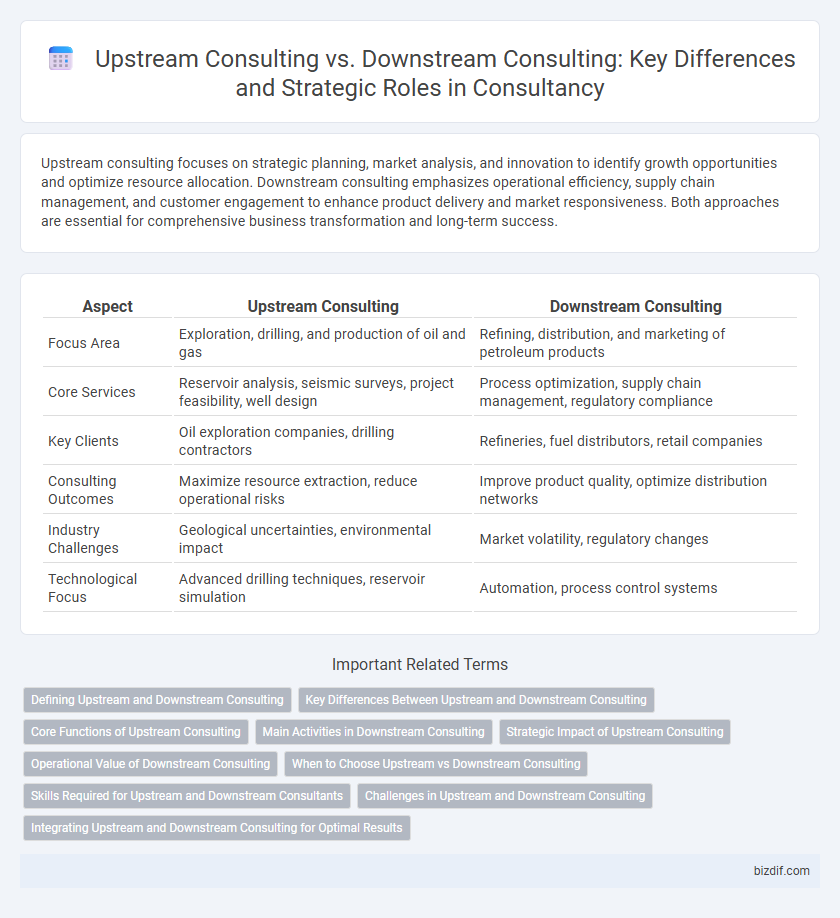Upstream consulting focuses on strategic planning, market analysis, and innovation to identify growth opportunities and optimize resource allocation. Downstream consulting emphasizes operational efficiency, supply chain management, and customer engagement to enhance product delivery and market responsiveness. Both approaches are essential for comprehensive business transformation and long-term success.
Table of Comparison
| Aspect | Upstream Consulting | Downstream Consulting |
|---|---|---|
| Focus Area | Exploration, drilling, and production of oil and gas | Refining, distribution, and marketing of petroleum products |
| Core Services | Reservoir analysis, seismic surveys, project feasibility, well design | Process optimization, supply chain management, regulatory compliance |
| Key Clients | Oil exploration companies, drilling contractors | Refineries, fuel distributors, retail companies |
| Consulting Outcomes | Maximize resource extraction, reduce operational risks | Improve product quality, optimize distribution networks |
| Industry Challenges | Geological uncertainties, environmental impact | Market volatility, regulatory changes |
| Technological Focus | Advanced drilling techniques, reservoir simulation | Automation, process control systems |
Defining Upstream and Downstream Consulting
Upstream consulting focuses on strategic planning, market analysis, and product development to optimize early-stage processes and decision-making in a project lifecycle. Downstream consulting centers on implementation, operational efficiency, and customer engagement to enhance delivery, distribution, and post-launch performance. Both consulting types drive value but address different phases within the project or business cycle.
Key Differences Between Upstream and Downstream Consulting
Upstream consulting primarily focuses on exploration, production strategies, and resource assessment within the oil and gas sector, emphasizing technical expertise in reservoir analysis and drilling optimization. Downstream consulting centers on refining, distribution, and marketing, aiming to enhance operational efficiency, supply chain management, and regulatory compliance in petrochemical processing. Key differences include the operational phases targeted, specialized knowledge areas, and the distinct value chains they address within the energy industry.
Core Functions of Upstream Consulting
Upstream consulting primarily focuses on exploration and production activities, including geological surveys, reservoir modeling, and drilling optimization to maximize resource extraction efficiency. It involves identifying potential oil and gas reserves and developing strategies for cost-effective and environmentally responsible extraction. Core functions also encompass risk assessment, project feasibility analysis, and the integration of advanced technologies to enhance upstream operational performance.
Main Activities in Downstream Consulting
Downstream consulting primarily focuses on refining, marketing, distribution, and sales of petroleum products, ensuring regulatory compliance, optimizing supply chain operations, and enhancing retail and wholesale network performance. Key activities involve streamlining refinery output management, developing market entry strategies, and implementing advanced customer relationship management systems. Consultants analyze market trends, optimize pricing strategies, and improve operational efficiency to maximize profitability in refining and distribution sectors.
Strategic Impact of Upstream Consulting
Upstream consulting drives strategic impact by focusing on early-stage decision-making, market analysis, and innovation pipeline development, enabling organizations to optimize resource allocation and identify growth opportunities ahead of competitors. This approach ensures alignment with long-term business objectives, reduces risk through scenario planning, and fosters sustainable competitive advantages. By contrast, downstream consulting typically centers on operational efficiency and execution, limiting its influence on shaping core strategic directions.
Operational Value of Downstream Consulting
Downstream consulting delivers significant operational value by optimizing refining processes, supply chain logistics, and distribution strategies, ultimately enhancing product quality and cost efficiency. This consulting focus drives improved asset utilization, regulatory compliance, and market responsiveness within petrochemical and energy sectors. Clients benefit from tailored solutions that reduce operational risks and maximize profit margins through advanced analytics and process innovations.
When to Choose Upstream vs Downstream Consulting
Choosing upstream consulting is ideal during the initial stages of project development, focusing on exploration, research, and strategy formulation to optimize early-stage decisions. Downstream consulting should be selected when refining operations, enhancing production processes, or managing supply chain efficiencies is necessary to maximize output and profitability. Aligning the consulting approach with specific project phases ensures targeted expertise and improved operational results.
Skills Required for Upstream and Downstream Consultants
Upstream consulting demands expertise in exploration, geological analysis, and reservoir management, emphasizing technical skills in data interpretation and risk assessment. Downstream consulting requires strong knowledge of refining processes, supply chain optimization, and regulatory compliance, highlighting skills in process engineering and market dynamics. Both roles benefit from strategic thinking and project management competencies tailored to their focus areas within the oil and gas sector.
Challenges in Upstream and Downstream Consulting
Upstream consulting faces challenges such as unpredictable exploration outcomes, high capital expenditure, and regulatory complexities related to environmental impact assessments. Downstream consulting encounters difficulties in managing supply chain efficiency, optimizing refining processes, and navigating fluctuating market demand and compliance standards. Both sectors demand advanced data analytics and risk management strategies tailored to their specific operational hurdles.
Integrating Upstream and Downstream Consulting for Optimal Results
Integrating upstream consulting, which focuses on exploration and production strategies, with downstream consulting, centered on refining and distribution optimization, creates a comprehensive value chain enhancement in the energy sector. This integration enables data-driven decision-making across project lifecycles, improves operational efficiencies, and reduces costs by aligning supply chain management with market demand forecasts. Leveraging digital tools such as predictive analytics and process automation in both upstream and downstream functions maximizes profitability and sustainability outcomes.
Upstream consulting vs Downstream consulting Infographic

 bizdif.com
bizdif.com